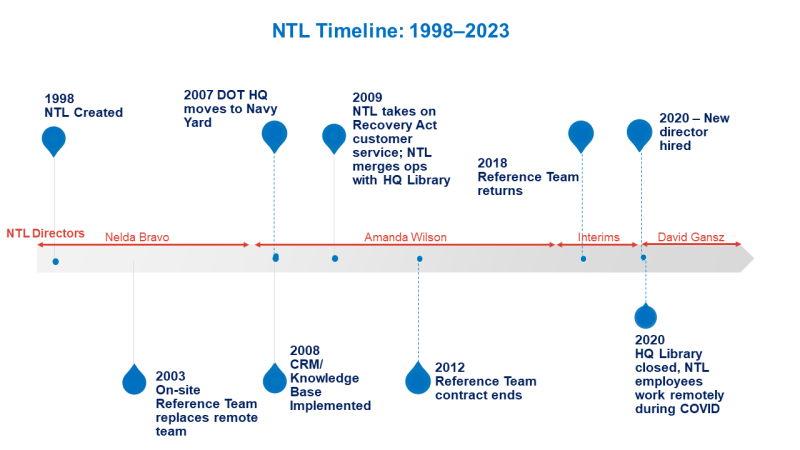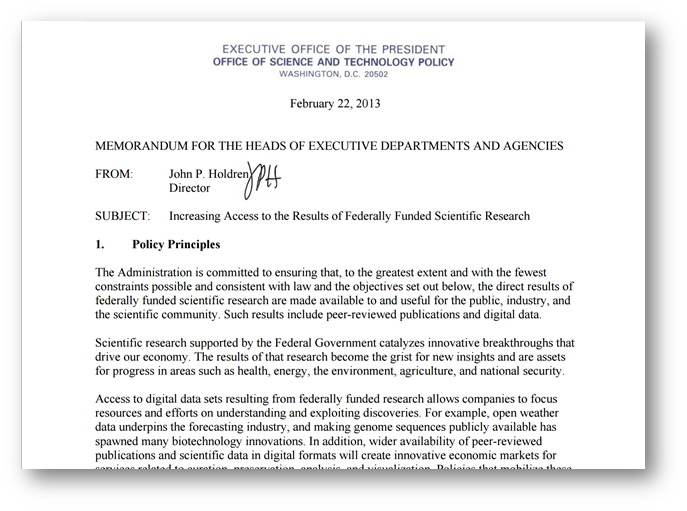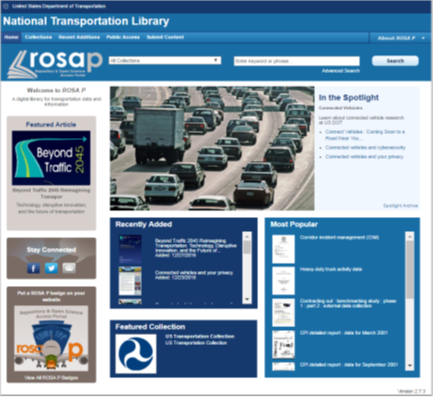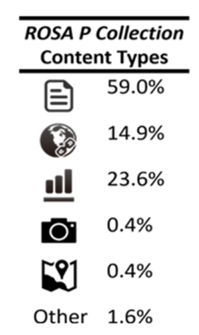National Transportation Library Marks 25th Anniversary
Data spotlights represent data and statistics from a specific period of time, and do not reflect ongoing data collection. As individual spotlights are static stories, they are not subject to the Bureau of Transportation Statistics (BTS) web standards and may not be updated after their publication date. Please contact BTS to request updated information.
June 9, 1998, was an important date in BTS history, as Congress enacted the Transportation Equity Act (TEA) for the 21st Century into law, authorizing the Federal surface transportation programs for highways, highway safety, and transit for a 6-year period from 1998 to 2003. The TEA Restoration Act, enacted on July 22, 1998, quickly provided technical corrections to the original TEA. Together, these two laws, known as TEA-21, established the National Transportation Library (NTL) as a permanent part of the Bureau of Transportation Statistics (BTS).
NTL provides access to transportation information, coordinates information creation and dissemination, and offers reference services for the transportation community. NTL, a fully digital library, has a collection of full-text documents and provides support for the National Transportation Knowledge Network (NTKN), a voluntary alliance of transportation organizations that supports a network of transportation information professionals, who collaborate to expand, improve access to, and preserve the domain of transportation knowledge.
NTL mandate expands with MAP-21.
NTL’s authorization expanded in 2012, when Congress passed the Moving Ahead for Progress in the 21st Century Act (MAP-21). MAP-21 mandated that NTL:
- Acquire, preserve and manage transportation information and information products and services for use by US Department of Transportation (DOT), other Federal agencies, and the public;
- Provide reference and research services, while serving as a central repository for DOT research results and technical publications;
- Become the central clearinghouse for transportation data and information of the Federal Government, as well as coordinate with external parties to develop a “comprehensive transportation information and knowledge network” and be policy lead for transportation information access; and
- Publicize, facilitate and promote access to information products and services.

NTL role continues to evolve.
Since 2013, NTL has become the centerpiece of DOT’s response to the White House Office of Science & Technology Policy’s memorandum, “Increasing Access to the Results of Federally Funded Scientific Research,” directs all Federal departments and agencies with more than $100 million in annual research to increase public access to the digital results.
As the needs of the transportation sector evolved over time, so have the resources available at NTL. The Transportation and Climate Change Collection is a curated selection of information on transportation and climate change issues used to help experts around the world mitigate the impacts of climate change when developing new transportation infrastructure. NTL also hosts the Transportation and Climate Change Clearinghouse, which provides links to monthly bibliographies of new content on this topic.

NTL breadth supports industry, government, and research community.
In its first 25 years of operation, NTL has enhanced the transportation industry’s research capabilities. Here are some highlights from the first 25 years of the NTL:
- Of the United States’ five national libraries, NTL is one-of-a-kind as it’s the only “born digital” national library. Of the 13 principal Federal statistical agencies, BTS is only one to house a national library, bringing the perspectives of information and library science to the organization and its preservation of statistical information
- NTL evolved from a BTS information-sharing project and was initially recognized by Congress in the Department of Transportation Appropriations Act of 1997, passed in September 1996, before TEA-21 authorized the NTL as a permanent part of BTS in 1998.
- The NTL Reference Team has become the go-to resource for any DOT topic, including Airline Traffic Data.
- NTL named its digital repository the “Repository and Open Science Access Portal (ROSA P)” after civil rights icon Rosa Parks in 2017, honoring transportation’s role in the movement.
- All NTL publications in ROSA P are free and in the public domain, and currently indexed by popular Internet search engines.
- ROSA P now contains nearly [or more than] 60,000 digital objects.

- Three different permanent directors have led NTL: Nelda Bravo, Amanda Wilson and David Gansz. Robert Zarnetske launched NTL under the direction of current BTS Deputy Director Rolf Schmitt with the theme “a complete reference library at your desk.”
- In 2009, NTL merged operations with the DOT headquarters library and began assisting in Recovery Act customer service.
- NTL has hosted more than 20 Summer Transportation Internship Program for Diverse Groups (STIPDG) interns.
- NTL staff are represented on the Transportation Research Board (TRB) Information and Knowledge Management Committee.
- After the DOT headquarters library closed in October 2020, NTL took responsibility for many of the subscription database contracts used by DOT staff. NTL began digitizing older DOT publications that were not available online.
- NTL hosts collections of historical incidents such as railroad and aviation accident reports from the early 20th century.
- Through NTL, DOT employees have access to inter-library loan services and proprietary reference services, a function absorbed from DOT Headquarters.
- Source materials kept in the NTL repository originate from DOT, state departments of transportation, local and tribal road agencies, university transportation programs, and other transportation-related organizations.
- Formal documents signed by previous Secretaries of Transportation are kept in NTL’s digital collection.

Though much younger than its peers (the Smithsonian Library was founded in 1846), NTL has become the premier resource for transportation information across the Nation. The knowledge, dedication, and commitment of the NTL team has helped guide the transportation community into better decision-making and smarter policies.
And finally, at age 25, the NTL is old enough to rent a car. Now it can see what this whole transportation thing is all about.
